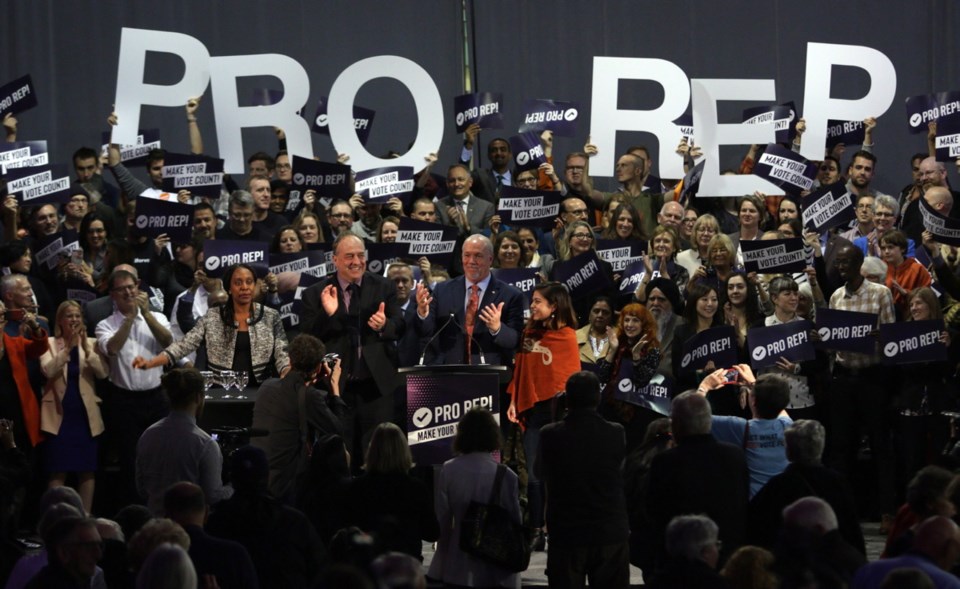 Almost 1,000 people showed up Tuesday night at a twin-bill rally for proportional representation.
Almost 1,000 people showed up Tuesday night at a twin-bill rally for proportional representation.
With polls showing B.C. undecided on the referendum question now being mailed to voters, the rally at Crystal Garden made one thing clear: People who want to change the voting system are very enthusiastic about the idea.
Premier John Horgan and B.C. Green Party Leader Andrew Weaver drew sustained applause while pitching the benefits of changing to any one of the three different systems that are offered on the ballot.
Since the change would all but guarantee minority governments, both leaders offered the past 15 months of minority government under an NDP-Green confidence agreement as an example of what proportional representation can bring about.
“Good things can happen when parties work together,” Horgan said, citing housing initiatives, the Medical Services Plan fee cut and child-care programs.
Adopting a new system would put people back at the centre of our politics, he said.
People can “vote for your values, your values will be reflected in the legislature. What could be better than that?”
He said it would address the problems of declining turnout and the low participation of young people.
The current system leads to polarization and extreme partisanship, he said, and has produced distorted results in Ontario, Quebec and New Brunswick.
Voters in those provinces “did not get the government they voted for.”
Weaver said that 18 months ago, the idea of him appearing at a rally with Horgan would have seemed like an alternate universe.
He said many want change, but fear of vote-splitting is a huge factor in the current system.
A new system would be more inclusive and people could “vote for what they want without fear of getting what they don’t want.”
The yes side’s first big rally was mostly positive energy, something it’s hard for the no side to match.
Anyone wanting to see the yes-no sides argue their cases directly can watch Horgan and Opposition Leader Andrew Wilkinson face off in a televised debate.
The exact date was the subject of a giddy half-hour question period Tuesday morning that moved into slapstick territory.
B.C. Liberals want to portray Horgan as afraid to debate, even though he’s committed to one. So they launched a barrage of questions on that imaginary theme.
“I’m ready any time, the television crews are ready,” Wilkinson said. “Pick a date.”
Horgan said he’s ready and willing, but still waiting for Wilkinson to debate the referendum in the house. “I don’t know what part of ‘yes’ that the Liberals don’t understand.”
Wilkinson said that Horgan “hasn’t got the guts to face the cameras because he’s a coward about this manipulative referendum and he hasn’t got the stomach to face the music.”
The effort to trigger Angry John failed. “If he wants an anatomy lesson, I thought he would have taken that up in medical school,” Horgan said.
The exchanges bring a famous New Yorker cartoon to mind: “How about never? Is never good for you?”
But there will be a debate. Horgan has committed several times and did so again. “As soon as the networks give us a time, I’ll see you there.”
Liberals are overly exercised about delays in working out the debate details. The one valid point is that it has to be soon. More people are getting ballots in the mail every day. They’re entitled to hear a debate before they vote, and ballots have to be in by Nov. 30.
Wilkinson followed the exchange with a news conference where he said initial reaction to the arrival of the ballots (the delivery is being staged regionally) is confusion. The envelopes contain a lot of paperwork and unclear questions that raise a lot of uncertainties about details.
Just So You Know: Opposition critic Mike de Jong was so moved by the issue that he wrote a poem and read it into the record. (Excerpt: “He’s turned this vote into a sham, I’m not surprised. That was the plan.”)
By the end of the argument they were joking about switching from poetry to modern interpretive dance. If the eventual debate is as weird as question period was, it will definitely be worth watching.



